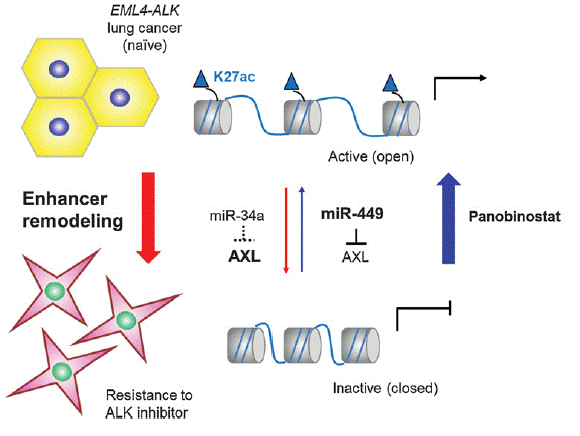New research suggests cause of drug resistance in subset of lung cancer patients
In some patients with lung cancer, tumor growth is promoted by an ALK gene rearrangement. Such tumors generally respond remarkably well to treatment with drugs known as ALK inhibitors. Unfortunately, resistance to such drugs is generally acquired within a year, leading to relapse in these patients. While the cause of this resistance appears to be the acquisition of additional mutations that enhance ALK expression in some patients, the mechanism of resistance in the majority of cases remains unknown, making these cases difficult to treat.
While genetic alterations occur when there is a change in the DNA sequence of a gene, epigenetic changes can also alter gene expression in a cell. Such epigenetic alterations include modifications made to histones, the proteins around which DNA strands are wrapped. These modifications serve to make the DNA encoding a particular gene more tightly packed, which generally decreases expression of the gene, or more loosely packed, which increases gene expression. Since the cause of drug resistance in the majority of patients with ALK mutation-positive lung cancer does not appear to be additional genetic mutations, Prof. Byoung Chul Cho from Yonsei University in Seoul, Korea and colleagues wondered whether resistance in these cases could be caused by epigenetic changes that affect gene expression in tumors. The authors present their findings in a recent report in Cancer Research.

DNA strands are wrapped around proteins called histones. Epigenetic modifications to histones can cause the DNA to be packed tightly, which causes genes to be inactive, or packed loosely, allowing genes to be expressed.
Using cell culture, mouse models, and tumor specimens from lung cancer patients, Prof. Cho and colleagues found that, as they suspected, there were massive epigenetic changes that occurred during the development of drug resistance in ALK positive tumors. According to Prof. Cho, “Most of these epigenetic changes were associated with miRNAs”, which are small molecules that act to inhibit the expression of other genes. This analysis revealed two microRNAs that normally inhibit the expression of the AXL gene, which is associated with epithelial-to-mesenchymal transition (EMT). Additional experiments showed that some of the aforementioned epigenetic changes had turned off the expression of these microRNAs, thus leading to AXL-dependent EMT gene expression.
Importantly, armed with a new hypothesis regarding the mechanism of resistance in such cases, the authors used a different type of drug, one that reverses the epigenetic changes they observed, to treat cancer cells that had previously exhibited resistance. A combination of this new drug, known as a histone deacetylase inhibitor, and the original ALK inhibitor showed remarkable effectiveness against cancer cells in culture and in mice.
Notes Prof. Cho, “Our results suggest new possibilities for the treatment of patients with ALK mutation-positive lung cancer.” Thus, the discovery that epigenetic changes likely underlie drug resistance in a subset of lung cancer patients promises to open up new avenues of research in other types of cancer and may eventually improve treatment options for cancer patients.
Updated in Dec 2018
Recommended Articles
Professor Hyuk-Jae Chang
Professor Sung-Joo Hwang